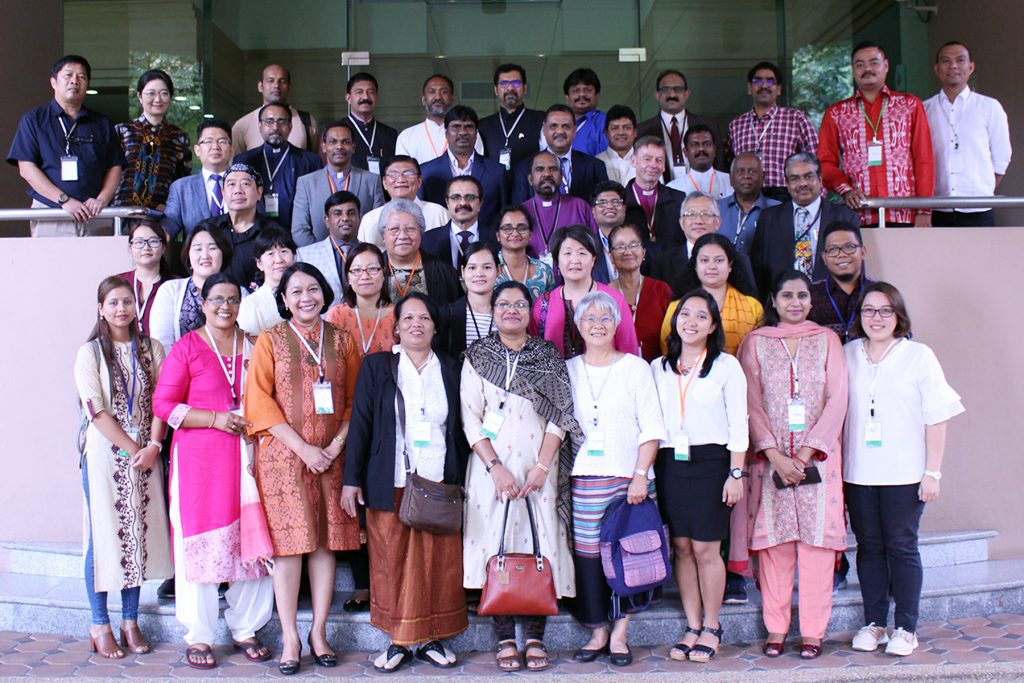CCA’s Regional Consultation addresses Migration, Human Trafficking, and the Asian Diaspora

An Asia Regional Consultation on ‘Migration, Trafficking in Persons, and the Asian Diaspora’ being held in Bangkok, Thailand from 12 to 14 November 2018 under the auspices of the Christian Conference of Asia (CCA) started with analyses and sharing on complexities of transnational labour migration, trafficking in persons and Asian diaspora.
The increasing trend of transnational migration is not only characterized by liberalization of trade, services, investment, and capital, but also by transnational movements of people in search of better lives and employment opportunities in other countries. However, the migrant workers are too often seen as exploitable and expendable, a source of cheap labour constrained to “3-D” work or working conditions: Dirty, Dangerous and Degrading, that local or nationals are unavailable for and or unwilling to accept.
In a thematic address delivered at the opening session, CCA General Secretary Dr. Mathews George Chunakara stated that “migrant workers are first and foremost human beings, and they also hold their unequivocal human rights and human dignity. Their rights and security require specific and special protection in all circumstances”.
“The transnational migrant workers are often denied legal protection; as such, they continue to face exploitation and denial of their right to decent labour and human rights. As transnational migration increases, the world witnesses today an alarming trend of migrant smuggling and human trafficking. Human trafficking is, thus intimately linked to the undercurrents of global migration”, added the CCA General Secretary.
More than 50 participants from different countries in Asia, including representatives of Asian Diaspora from the Arabian Gulf States such as Bahrain, Kuwait, Oman, Saudi Arabia, Dubai, Abu Dhabi, Sharjah, and Rassel Khaima also are participating in the consultation at the headquarters of the Church of Christ in Thailand in Bangkok.
In a biblical-theological reflection, Bishop Philip Huggins, President of the National Council of Churches in Australia said, “What we need is a sustaining spirituality to look at the world and respond with a renewed energy to reduce or prevent suffering with a resilient spiritual practice, which is biblically and theologically coherent”.
Bishop Huggins added that “much work is needed to ease suffering of those vulnerable people impacted by human trafficking and labour migration in Asian countries”.
In a panel presentation focused on ‘Labour Migration of Asian’s within and Beyond Asia’, Rev. Joshua Rho who works with the Presbyterian Church of Korea’s migrant mission, the ‘M-Centre’ in An-san industrial area said, “significant percentage of the foreign workers in Korea suffer human rights violations including violence and forced labour”.
“Prejudice is the biggest challenge that foreign workers face as Korean workers are highly prejudiced against their foreign co-workers, with their differences in language, religion, and culture due to lack of experience of living harmoniously with foreigners”, said Rev. Rho. .
Rev. Michiko Nishinosono, Chair of the Commission of the Ecumenical Ministry of the United Church of Christ shared the problems foreign workers may be experiencing in Japan such as human rights violations, hate speech, latent racial discrimination, and the difficulty of mutual understanding.
She added that “Japan grapples with a serious labour shortage because of an aging society with a low birthrate and the needs related to the Tokyo Olympic in 2020. Although the government plans to recruit more foreign workers starting from April 2019, the government tries to introduce many restrictions which will not allow the overseas migrant labour forces to work in a congenial atmosphere”.
Chang-Jung Chien of Presbyterian Church in Taiwan (PCT), who heads the ‘Presbyterian Church in Taiwan Labor Concern Center’ explained the situation about the problems encountered by foreign workers in Taiwan, and PCT’s efforts in providing counseling and emergency shelter placement assistance to the foreign migrant workers.
“There are many cases of labour exploitation often reported and the anti-trafficking law also cannot protect the interests of the victims or prevent human trafficking”, said Rev. Chien.
Rev. Dr. Rungtiwa Mamo of the Church of Christ in Thailand described five patterns of human trafficking prevail in Thailand such as sex trafficking, forced labour, forced marriage, forced begging, and children used for drug trafficking.
“The undocumented migrants from neighobouring Myanmar and Cambodia are more vulnerable to trafficking and prostitution in Thailand”,
Rev. Diana Tana, the Vice Moderator of CCA who led a Pastoral Solidarity Team visit to the United Arab Emirates in June this year stated that the Asian churches must pay more serious attention to protect the rights and dignity of the migrants and the trafficked persons who live in our midst and experience vulnerable situations as they are strangers and aliens, but created in the image of God”.
The second day’s deliberations will focus on the Migrant Asian Diaspora in West Asia which is commonly known as the Arabian Gulf.










